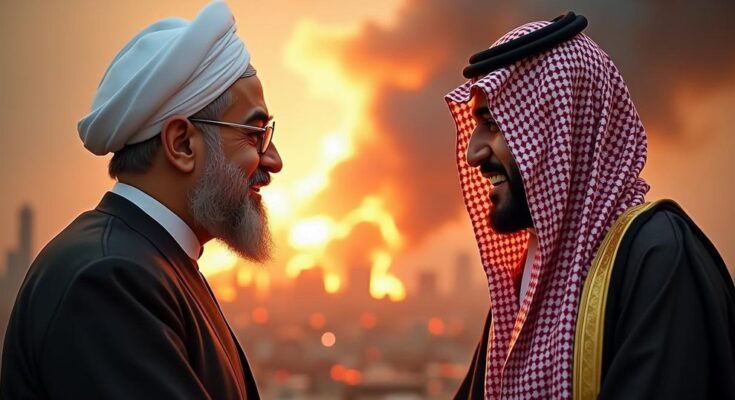Iran has threatened to target Saudi oil sites if Saudi Arabia facilitates Israeli attacks. Iranian Foreign Affairs Minister Abbas Araghchi warned Saudi officials that potential cooperation with Israel could provoke military responses, including mobilizing Iranian-backed militias. The fragile 2023 truce between the rivals faces significant strain amid escalating tensions following Israeli strikes related to Iranian-backed forces. Should conflict arise, it may severely disrupt global oil markets given Saudi Arabia’s position as a leading oil exporter.
Recent reports indicate that Iran has issued explicit threats to attack Saudi Arabian oil installations in response to potential Saudi cooperation with Israel in military actions against Iran. Iranian Foreign Affairs Minister Abbas Araghchi met with Saudi officials in Riyadh to convey Tehran’s position that permitting Israeli aircraft to utilize Gulf airspace for strikes would be considered an act of war. Araghchi’s warning included the possibility of Iranian-backed militias in Iraq or the Houthis in Yemen being mobilized against Saudi targets. Ali Shihabi, an analyst with close ties to the Saudi royal court, remarked, “The Iranians have stated: ‘If the Gulf states open up their airspace to Israel, that would be an act of war.'” Furthermore, as reported by The Wall Street Journal, Iran has allegedly communicated through covert channels that it might expand its targets to include US allies in the Middle East, particularly if Israeli operations against Iran are facilitated by Gulf nations, notably citing Jordan, the UAE, Saudi Arabia, and Qatar, which host US military bases. The situation is further complicated by rising tensions in the region. Israel has substantially intensified its military operations against the Iran-supported Hezbollah militia in Lebanon, leading to an Iranian missile strike on Israel on October 1. Israeli leaders have responded with declarations to retaliate, including threats against Iran’s nuclear capabilities and oil facilities. The emergence of this conflict comes amidst a fragile truce brokered by China in 2023 between Iran and Saudi Arabia, wherein both nations sought diplomatic normalization after years of proxy conflicts, such as in Yemen. Although this notion of peace has faced tests, including the October 7 attacks by Iran-sponsored Hamas, the overall truce has largely endured despite the region’s volatility. Analysts indicate that engagement between the two nations is essential for minimizing potential conflicts and that a new military action targeting Saudi oil infrastructure could significantly disrupt global oil markets, pushing prices higher amidst ongoing uncertainties.
The context of the tensions between Iran and Saudi Arabia stems from a long-standing rivalry that has often manifested through proxy conflicts across the region, particularly in Yemen. The fragile truce established in 2023 aimed to reduce hostilities and promote diplomatic engagement following years of conflict where both nations supported opposing factions. The recent threats from Iran come as both countries are facing pressures related to heightened military operations involving Israel, which has become increasingly aggressive in the region. The potential impact on global oil prices is significant, as Saudi Arabia is the largest oil exporter, and any conflict involving its infrastructure could have widespread implications for the energy market.
In summary, Iran’s recent threats against Saudi Arabia highlight the precariousness of the current truce between these two regional powers, amidst escalating tensions involving Israel. The potential ramifications of military conflict include not only regional stability but also significant impacts on global oil markets. As analysts suggest, the path towards lasting reconciliation may hinge upon continued diplomatic efforts to manage these heightened hostilities, particularly with the backdrop of Israeli aggression against Iran-backed groups.
Original Source: www.businessinsider.com




